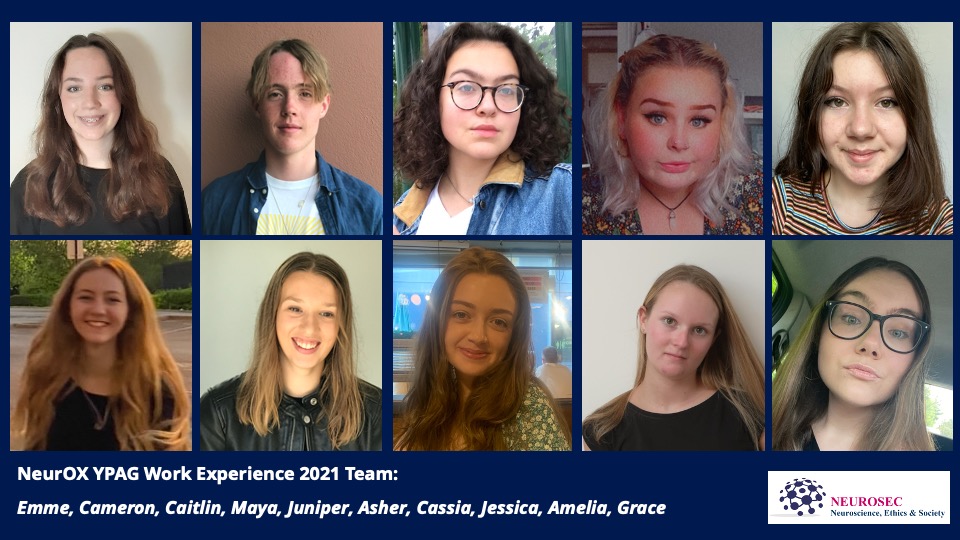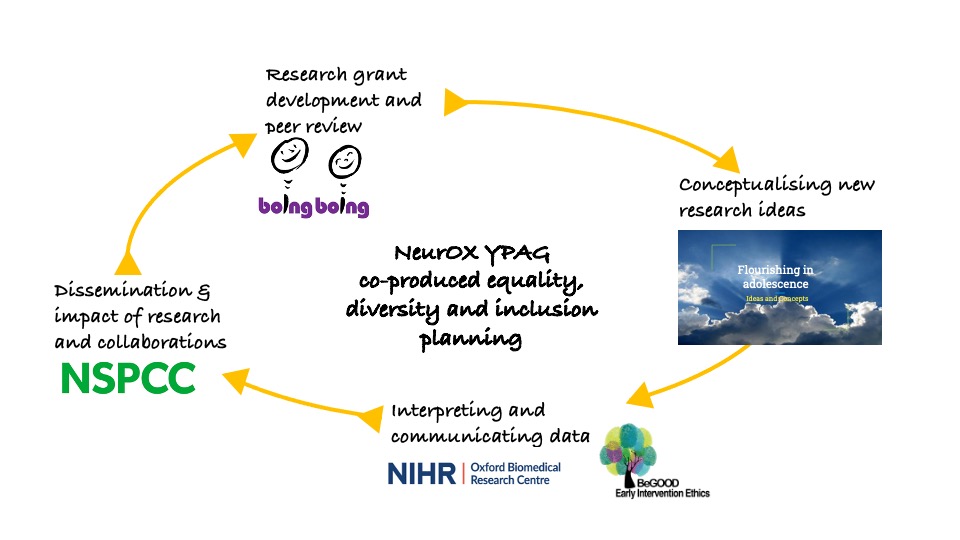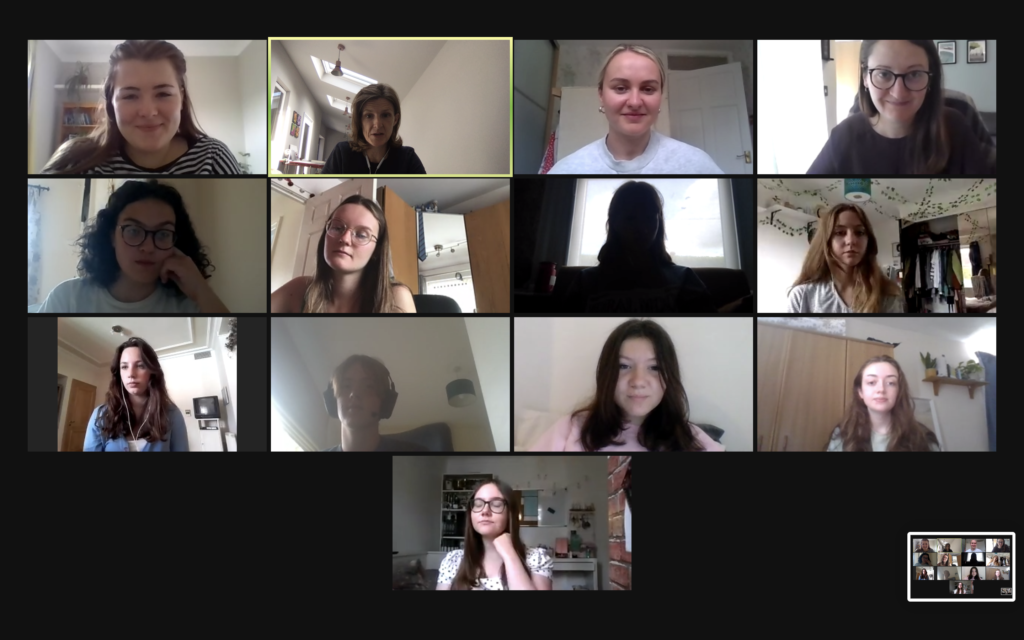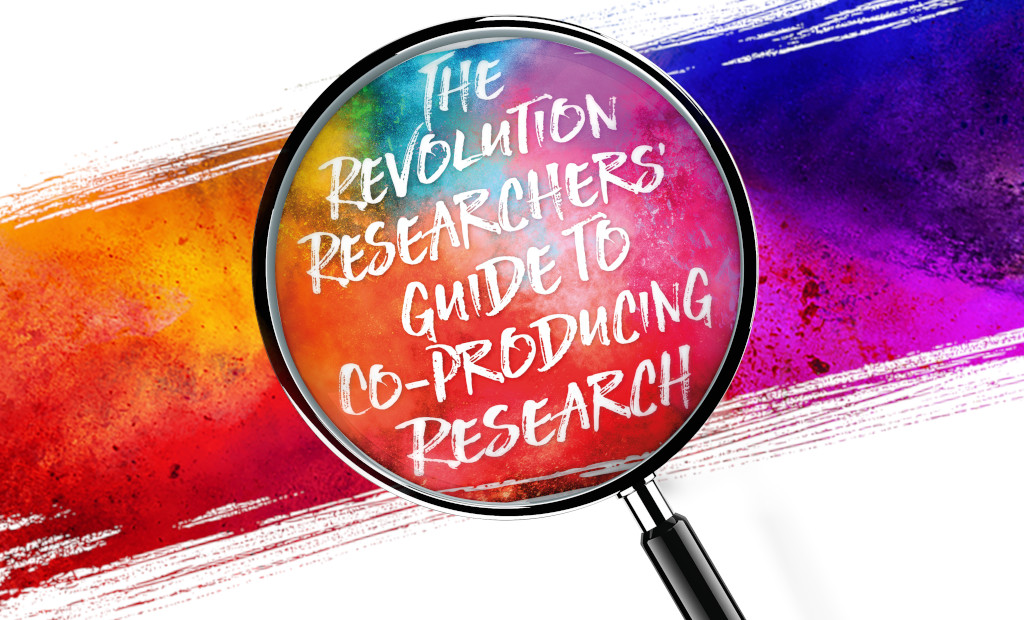
By Vanessa Bennett, Lead Researcher for the NeurOX Young People Advisory Group
Last week we ran our second annual virtual work experience week collaborating with 10 young people, aged 16-19 years, from our NeurOX Young People Advisory Group (YPAG).

‘Work experience’ has been difficult – or impossible – to come by for many young people over the past 18 months so I wanted to make sure it was a rewarding experience! Virtual is no substitute for the real thing but there were certain things that I felt were possible. For one, developing new knowledge and skills that they could apply in many aspects of their lives and our co-produced research. Also, the group have been together for about 18 months and only met twice physically before the pandemic, therefore the greatest challenge was building and running an exciting, engaging, rewarding, and ‘social’ programme!
We tried some different approaches to enable the group to connect and socialise, and get to know each other and some of the researchers better. We provided variety as much as we could in the content and brought in some external groups to mix things up. I think we offered the opportunity to be involved in ‘real’ research from the very start, and learn from a variety of professionals about different roles and objectives within the full research cycle, and the impact research can have. It was a busy week covering a lot of ground. I’ll give an overview of the programme and a summary from a few of the key sessions.
Programme built about building knowledge and skills with and through experience

“Having a large range of people come in to talk to us combined with doing lots of different tasks really gave us a sense of how diverse the research process is”
The young people spent a substantial part of the week co-producing research:
- Conceptualising ideas, approaches and collaborations for new research around flourishing in adolescence.
- Implementation planning for the Young People’s EDI strategy around widening involvement of young people in research for the NIHR Oxford Health BRC. As a continuation of our involvement strategy for young people, we also planned how to include more diverse views of young people throughout our new research.
- Interpreting and considering how to disseminate data from the Citizens: BeGOOD Early Intervention Ethics research. More info on this will be coming in September but read a little about this at https://oxneurosec.com/projects/begood/begood-citizens/ and here.
- Working on the dissemination and impact of the co-produced NSPCC/Childline message board research project.
- Building a new collaboration with Boingboing researchers and gaining new skills in peer review of research proposals.
What is Flourishing to young people?
Professor Ilina Singh introduced the concept of ‘Flourishing’, a little about its philosophical origins, and invited the group to dig a little deeper into this new topic with some ‘free’ exploratory questions in the initial briefing session.
“I loved working on the new Flourishing project, as it was something new and refreshing that I found really interesting and thought had a lot of future potential“
The group was overwhelmingly enthusiastic about this new topic. Perhaps having a stake in something new and fairly undefined in adolescent mental health research also fuelled motivation and creative license. This was evident in the impressive ‘miro’ brainstorming sheets and ‘padlets’. Each team talked through and discussed their initial ideas with Ilina and I (on a Zoom ‘round’) after their first half-day of research. After offering a little more support and direction and giving time and a virtual space, they all came together and organised themselves to research different aspects, develop and present back their proposals at the end of the week.
Interestingly their discussions picked up on points they’ve raised recently as a group (read more about this here). In particular, they welcomed the holistic (and possible preventative) approach to mental and physical wellbeing. However, they felt ‘’flourishing” should not trivialise or replace clinical support when professional support is needed but see it rather as something to be done alongside other treatment in many cases.
Here are a few of their insights and recommendations:
- Breaking down ‘flourishing’ into components that are important in young people’s lives is important – really thinking about what it means to diverse groups of young people.
- Language and communication is important – making it accessible and inspiring, not patronising, not “fluffy” but not dumbing down either. Avoiding complex (and philosophical) language or buzz words that don’t resonate with them (e.g. “mindful”) or feels performative and unachievable (e.g. “state of excellence”).
- Acknowledgement that it would require a certain commitment to everyday practice for young people to develop a “flourishing mindset” – they started to explore barriers and facilitators.
- Creating environments and working with venues that young people feel comfortable in are critical to make the research accessible to all young people.
- Collaborating and co-producing with other groups working with young people to include perspectives of those with different backgrounds, ethnicities, experiences, levels of financial and family support.
Drilling down into an approach for the research, they started to explore:
- Existing research and components/dimensions of flourishing and what a “concept of modern-day flourishing” for may look and feel like for young people.
- Potential ‘living laboratories’ that may appeal to young people and how to take the Oxford Garden, Libraries and Museums (GLAM) to young people to make them more accessible and inviting.
- What to consider and how to collaborate with other groups to include young people with different needs, lifestyles, experiences.
- Defining short, medium and long-term strategies for involving diverse YP in the research.
- Different approaches to measuring flourishing that provide meaningful insights into what “hopeful outcomes” and a “flourishing mindset” may look like.
- How to motivate young people – using different media and approaches to make the study programme appealing and enhance involvement in the research and study participation.
- Identifying challenges and solutions to the research approaches.
Dissemination and impact of research and collaborations – NSPCC/Childline
This session really came about through a research collaboration that I embarked on a year ago with the NSPCC/Childline through an Emerging Minds Cross-sector placement project. We were grateful to the NSPCC Policy and Funding teams who ran a full-day programme focussed on dissemination and impact of research tailored to mental health, including some research that the young people had already been involved in from my initial project.
“I liked the new perspective that the sessions brought – how to make projects appealing and how to sell them, such as to funders and people awarding grants“

Two workshops and group working:
- Abigail Gill, Charlotte Grist and Ellie Pirrie from the NSPCC Policy Team informed and helped the young people (YP) develop policy campaigns and letters to local MPs around aspects the YP felt were important issues related to their mental health. The team have provided some great feedback to the young people on these.
We found that many young people are engaged in mental health by influential figures and media, and are encouraged by knowing their views are being heard.”
- Edgar Sutcliffe who heads up the NSPCC High Value Funding team and Jennifer Baskerville from their High Value Communications Teams ran a workshop around dissemination and impact. They guided the young people to produce communication pieces based on the evidence and recommendations from the co-produced Childline Message Board research (Emerging Minds Funded Cross-sector Placement). Their work is being taken forward with the NSPCC to produce a final output that will be used to leverage funding from high value donors, alongside other communication outputs. There will be more about this in September/October.
…really enjoyed working with the NSPCC as a continuation of the message boards study, building on that experience”
Starting up and learning from new collaborations – with BoingBoing
We were pleased that Caroline Beswick from Boingboing kindly ran a session with the young people to give them some experience of peer reviewing a research proposal. Boingboing work with and for people who have lived experience of adversity and multiple identities. They have a wealth of experience and expertise in co-production so it is great to be starting to collaborate with the group – this was the perfect opportunity to start building the relationship.
Caroline talked a little about their approaches to research, resilience and the role of activism in current and future research. You can read more about this here: https://www.boingboing.org.uk/civic-activism-mental-health-intervention/
The BoingBoing session was really interesting, I feel like I was actively working as a researcher during that
Developing my peer review skills with the other members means I can see the different perspectives of the same study from a diverse set of young people
Activism and mental health is such an interesting concept, it was good to hear other young people’s perspective on it

We would fully recommend a read of their on-line resources around working with young people and co-production which we are also using to inform our involvement strategy moving forward. https://www.boingboing.org.uk/co-producing-guide/
A little about the practicalities of on-line approach to work experience and some tips for finding our ‘virtual’ balance…
Beyond a framework of ‘plenary’ briefings and some workshops, the group had a great deal of autonomy, time and space to organise themselves to define their own balance (with a little help from a drop in Zoom room with me!).
Things that seemed to work well included:
- We generally started and ended the day with a researcher check-in where we could get organised, assign breakout rooms, raise any questions, etc.
- Having briefing sessions in the large groups and breaking out into 2 or 3 smaller working groups for the majority of time, and letting themselves re-organise themselves throughout the week
- Scaffolding, checking in and providing feedback throughout the week helped the YP develop and organise their ideas and facilitate the process.
- Supporting each other – some YPAG members had some 1:1 support and came to me with questions via the open Zoom drop-in, and they supported each other using a What’s App group.
- Having frequent, flexible breaks from the screen, and each other, on individual research – the YP organised this themselves.
- Using our existing platforms and tools – Zoom, What’s App, padlets, google drive and google apps
- Trying out a few new on-line tools to mix things up a little – miro and slack! Miro was fantastic!
- Mixing the groups up to facilitate working with different people and getting to know each other
- Focussing on some key outputs and a final presentation to the NEUROSEC Team at the end of the week enabled them to structure and organise themselves throughout their ‘own’ research sessions.
- Having an open Zoom room for the week, and a researcher (me) available to respond and shift people between rooms and pop them back in when wifi dropped out!
Some of this built on a recent NeurOX YPAG digital session that we held in March where we found the young people really enjoyed meeting each other in smaller breakout rooms without researchers ‘in the room’ to discuss and collate their thoughts. A little more on this here.
For more information and guidance from the YPAG on our digital approaches to involvement take a look here: https://oxfordhealthbrc.nihr.ac.uk/patient-and-public-involvement/young-peoples-involvement/
How did it go… young people’s reflections on the week
I learned to not be as afraid to give my view on things, and it was nice for my contributions to have an effect on the overall result. To work well and function within a group. A stronger ability to find a problem or a question and being able to break it down so it’s more manageable, also an enhanced belief on how important and useful this skill is. A stronger ability to go into more detail on things I would usually just ignore in order to structure my point better.
I really enjoyed learning from experts in their fields and broadening my knowledge of subjects. The work this week has been fulfilling and it’s lovely to hear more about the research being done.
I loved working on the new Flourishing project, as it was something new and refreshing that I found really interesting and thought had a lot of future potential, but equally I also really enjoyed working with the NSPCC as a continuation of the message boards study, building on that experience. One thing I think I managed to improve upon as a result of this week was the ability to quickly come up with, flesh out, and implement ideas, in the various projects, studies and mindmaps we had to think about.
I have really enjoyed discussing upcoming research particularly that of the BOINGBOING organisation and discussing our opinions on new studies being done. I have found it really interesting listening to organisations talk about there studies and coming up with new ideas on ways to help/improve the research. I have found listening and discussing with the other members of the group really useful as I was able to gain an insight into the new perspectives and ideas that different participants of different ages and experiences have.
The best part of this week for me was reviewing the boing boing research proposal and the flourishing project, as we haven’t done something anything like it before. The boing boing project has especially helped me understand how research projects are established, and the amount of work that goes into it before the project has even begun.
I found the peer review process really useful as it allowed us to look at a study from a different perspective and the analysis is a useful skill to have in the future. I also think that working together to develop ideas for the flourishing project has developed my teamwork and communication skills. The NSPCC session helped me to understand how to effectively communicate with different target audiences and how the politics behind mental health funding works.
It is more important than ever that young people have an input in mental health research so future projects and initiatives will be the most effective. I enjoyed meeting the speakers and getting to learn about their projects and efforts towards young people’s mental health.
The work experience week was a really rewarding process that allowed me to express my opinions on projects that are crucial to the future. We welcomed guest speakers from various organisations who introduced us to their work; we presented our ideas and received feedback from each speaker. Meeting the founder of the YPAG was one of the most interesting parts because we got to listen to why and how the group was started in the first place. I now have a better understanding of the thought-process behind co-production, as well as the way in which it’s carried out.
The work experience was a wonderful way to get involved with other youth after a year of disconnect. Regardless of it being ran online, I felt like the whole group really succeeded at having very in depth and insightful discussions on all the tasks, I felt this really ensured the work experience was engaging as all points of conversation had involvement from all. The work with external people was most interesting as it was all very new concepts and/or research, especially the work with boing boing as we were able to reflect on an entirely new ideas which is by far my favourite part of the YPAG experience. Being able to bring all our thoughts and ideas together for each task to present really allowed you to amplify your own ideas alongside being able see how others had tackled the same questions which was really rewarding as you could see how everything came together at the end finishing on a really positive note each day. Overall, I loved being involved and found the entire experience insightful.


